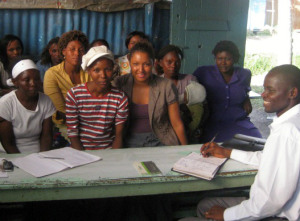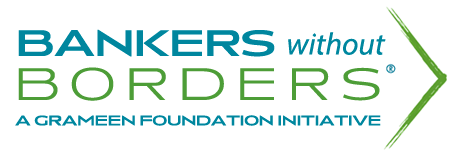Yolanda Walker is a South African living and working in the US. She is a graduate of Oberlin College, where she studied Economics. During her college career she studied International Business in France and Mandarin in China. Yolanda also lived in Ghana, where she volunteered at an orphanage. Most recently, Yolanda volunteered with Grameen Foundation’s Capital Markets team through our skills-based volunteer initiative, Bankers without Borders®. An associate at Capital Group Companies, an investment management company, Yolanda is based in California.

Bankers without Borders volunteer Yolanda Walker (center) attends a borrower’s group meeting in Kenya.
One of the many perks of being a part of The Associate’s Program (TAP) at Capital Group Companies is having the opportunity to leave our company for four to five months and completely immerse ourselves in a non-profit organization – with the flexibility to choose any organization, in any industry. As I was contemplating my various service opportunities, a manager at Capital Group handed me a book about a group of individuals whose lives were affected by microfinance. As I perused the document, it became clear to me that this emerging form of finance fosters genuine empowerment for marginalized communities. I was hooked. I grew up in a family of six that, for many years, survived on only $4 a day. My personal experience enabled me to closely relate to the issues that microfinance clients face. Growing up outside of Cape Town, I knew hunger, and remember often having to stand in food lines when my parents couldn’t afford to feed us. I knew about sleeping in the cold and dark. I knew, at age 10, what it meant to have a job, as I swept classrooms after school in exchange for a loaf of bread. I also knew the fear of potentially having to drop out of school – like my brothers – to take on another job that would bring extra money into our household. These vivid and profoundly life altering elements of poverty were very real for me as a child. So, how did an individual like me end up working at one of the biggest mutual fund companies in the world? My response: hard work, chance encounters and the grace of God. When I read about the impact of microfinance around the world, I became fascinated and wanted to know more. As I learned more about it, Grameen Foundation quickly became the obvious choice for my non-profit rotation.
While volunteering at Grameen Foundation through Bankers without Borders, I learned that the microfinance industry is revolutionizing the way we deal with poverty around the world. My main take-away from my experience is around the businesses community’s involvement in poverty alleviation. If the broader finance industry – along with other consumer industries – re-examines its approach to serving poor individuals, it will realize it’s serving a huge, untapped market. When we shift our thinking, and start to acknowledge poor people as viable clients, magical things start to happen. We are able to produce economic products that suit their needs. During my rotation, I learned about the incredibly innovative approach that Grameen Foundation, and the rest of the players in the industry, are taking to alleviate poverty. One of the products that I learned about at Grameen Foundation was its Growth Guarantee program, in which it guarantees a loan from a local bank to help a microfinance institution (MFI) develop credit history and gain access to financing in local currency. Besides having an enormous impact – it has helped created microloans for more than 1.2 million people – this program creates a win-win-win scenario: the MFI gets greater access to capital without currency-exchange risk, the bank develops a relationship with a new client, and the investors – whose assets are backing the guarantees – are able to be part of a system that helps reduce poverty while continuing to invest their assets. This program seems like an obvious solution, yet very few institutions were providing guarantees on this scale when Grameen Foundation started its program in 2005. The fact that more financial institutions are now offering this service demonstrates Grameen Foundation’s leadership in the microfinance space. The lesson here is that the future is now, and it belongs to the visionaries who see beyond the corners of traditional business and finance – who realize that today’s impoverished communities can be tomorrow’s engines of economic change and human dignity.

